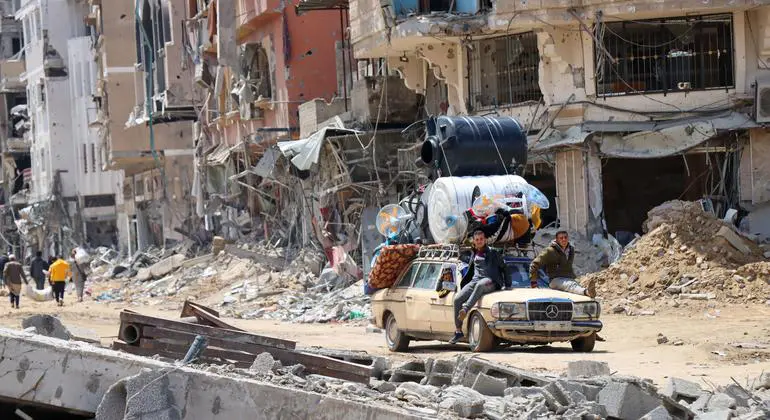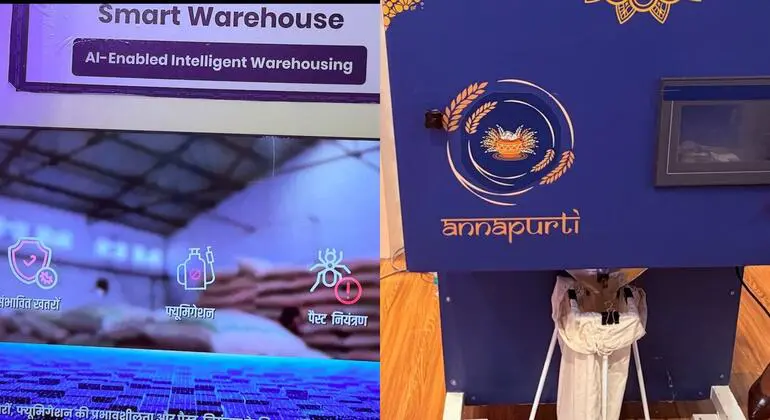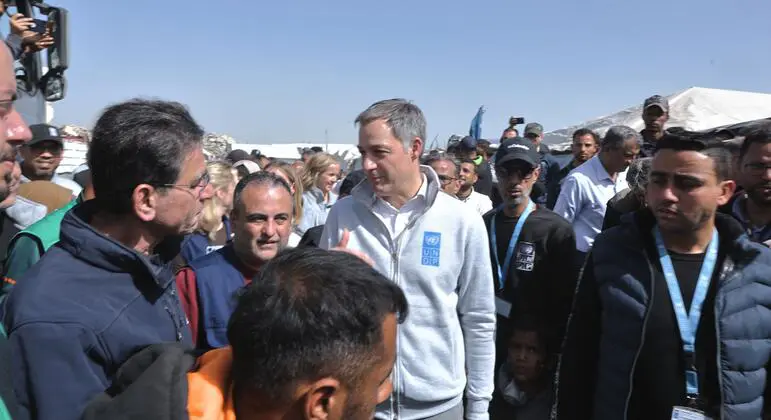UN and partner agencies insisted on Wednesday that “critical changes” are needed to improve aid access into Gaza, as they launched a $2.8 billion appeal to provide urgent assistance for millions of people in the devastated enclave, but also in the West Bank, where Palestinians have been targeted by increasing settler violence.
The development came amid reports of ongoing Israeli bombardment of the Gaza Strip including Gaza City in the north, Rafah in southern Gaza and central Gaza, where more than dozen people were believed to have died in an apparent missile attack on a refugee camp on Tuesday.
Video images reportedly from Al-Aqsa Hospital in Deir Al-Balah showed injured and dead victims including children after the strike on Maghazi refugee camp in the centre of the enclave.
Hunger peril
Wednesday’s appeal covers assistance to 3.1 million people between now and the end of the year.
It envisages helping 2.3 million people in the Gaza Strip where food insecurity experts have warned that imminent famine looms in the north after more than six months of intense Israeli bombardment and a ground offensive, launched in response to Hamas-led terror attacks in southern Israel last October.
Street vendor kids
“Famine is imminent in the northern governates and projected to occur anytime between now and May 2024; more than half the population of Gaza is facing catastrophic levels of hunger,” OCHA said, adding that markets lack basic food items and rely on informal suppliers offering aid rations.
“A concerning trend identified is the rise of reselling humanitarian aid in markets, particularly informal street vendors, many of whom are young children.”
Leading the appeal, OCHA noted that the funding request covered the requirements of the UN agency for Palestinian refugees, UNRWA, which continues to be “the backbone” of the humanitarian response in Gaza and the West Bank.
UNRWA’s key role
“Two thirds of the population of Gaza – 1.6 million people – are Palestine refugees registered with UNRWA,” OCHA said, adding that nearly one million of the 1.7 million displaced people now shelter across 450 UNRWA and public shelters, or in the vicinity of the UN agency.
OCHA added that UNRWA has more than 13,000 staff in Gaza, with more than 3,500 engaged in aid relief. “In times of emergency, (UNRWA’s) support is extended to the broader population,” it said, adding that the UN agency also serves 1.1 million Palestine refugees and other registered persons in the West Bank, of whom 890,000 are refugees.
Water plight
Lack of access to clean water continues to be a major humanitarian concern, OCHA noted, with only one of three water pipelines coming from Israel still operational at only at 47 per cent capacity.
There are also fewer than 20 groundwater wells which only work “when fuel is available” and no fully functional wastewater treatment systems, OCHA reported, adding that sewage overflow has happened “in many areas adding to the public health risk across Gaza”.
Rafah concerns
Citing a recent WASH assessment led by UNICEF, OCHA noted that it had found that within the 75 sites assessed in Rafah – covering a population of approximately 750,000 people – one third had water sources that were unsafe for drinking.
This included 68 per cent of the UNRWA collective centres, and average water availability was just three litres per person per day.
Following the withdrawal of Israeli forces from southern Gaza earlier this month, humanitarians have voiced repeated concerns about a military operation against Hamas’s military wing by Israeli Defense Forces in the city of Rafah which borders Egypt and where more than a million people currently shelter.
Needs remain dire in northern Gaza amid ongoing aid obstacles including refusals from Israeli authorities to allow access for humanitarian missions.
Tedros concern
In a social media post on Wednesday, UN World Health Organization (WHO) Director-General Tedros Adhanom Ghebreyesus highlighted how Monday’s mission to Gaza City had been “severely delayed, leaving less time” to assess damage and requirements at the devastated Al-Shifa Hospital and Indonesian Hospital.
“The removal of dead bodies at Al-Shifa is still ongoing,” Tedros said on X. “The emergency department is being cleaned by health workers and burnt beds have been removed. The safety of the remaining construction still needs a thorough engineering assessment.”
The Indonesian Hospital is now empty but efforts are underway to open it again, Tedros said.
The Palestinian Medical Relief Society medical point is admitting trauma patients but remains “in dire need of fuel and medical supplies”, which the UN health agency chief pledged to deliver.
“The level of destruction of Gaza’s hospitals is heartbreaking. We again call for hospitals to be protected, not attacked or militarized.”
Latest data from the enclave’s health authorities indicates that at least 33,800 Palestinians have been killed and over 76,500 wounded in Gaza since 7 October. The death toll in Israel from Hamas’s October 7 attacks stands at 1,139 and dozens of people are still being held captive in Gaza.
Some 259 Israeli soldiers have been killed in ground operations in the enclave with more than 1,570 injured, according to the UN aid coordination office, OCHA.
Humanitarian action
Wednesday’s appeal replaces a previous call for funds in October 2023 that was updated in November and extended through March 2024.
The $2.8 billion figure represents only part of the nearly $4.1 billion that the UN and partners estimate is required to meet the needs of the most vulnerable but it reflects what aid teams believe is implementable over the coming nine months.
Later on Wednesday, the UN Security Council was due to discuss the rapidly evolving situation in the Middle East, with a briefing by UNRWA Commissioner-General Philippe Lazzarini.







